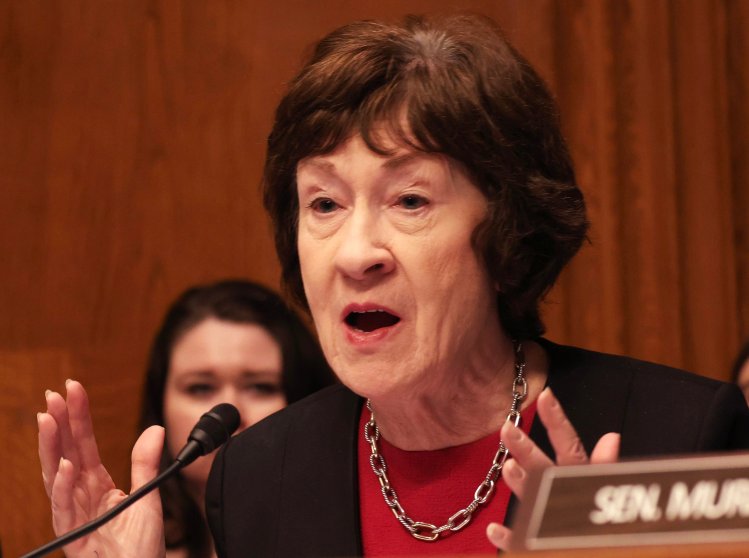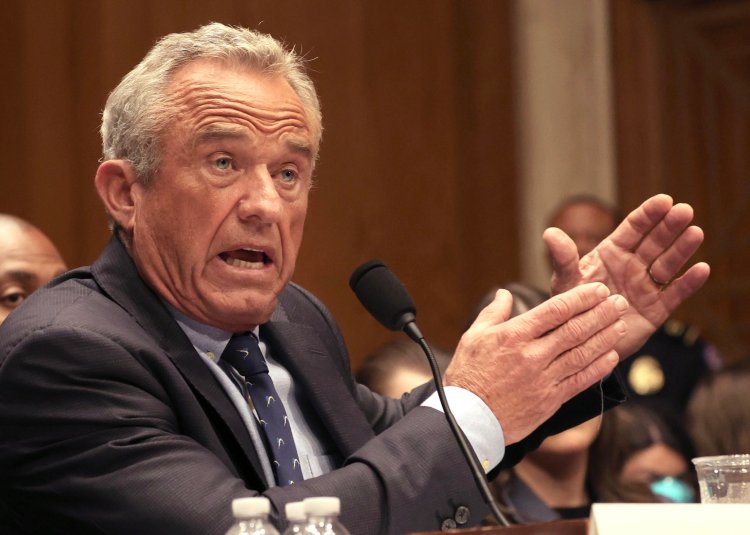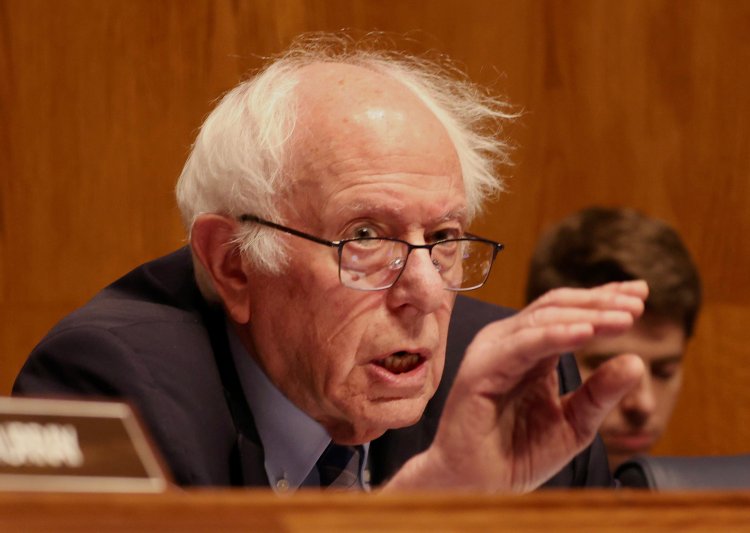


Sen. Susan Collins, R-Maine, questions Secretary of Health and Human Services Robert F. Kennedy Jr. at a Senate Health, Education, Labor, and Pensions Committee hearing on the 2026 HHS budget Wednesday. Joe Gromelski/for the Sun Journal
Sen. Susan Collins pressed Health and Human Services Secretary Robert F. Kennedy Jr. to defend the Trump administration’s cuts to health research funding and programs to combat Alzheimer’s disease during a high-profile congressional hearing on Wednesday.
In an often-combative hearing before the Senate’s Health, Education, Labor and Pensions Committee, senators asked Kennedy pointed and accusatory questions about the agency’s gutting of numerous health initiatives. At times, Kennedy and Democrats on the committee talked over each other.
Protesters interrupted Kennedy during his opening remarks, and they were removed by Capitol Police.
In one exchange, Kennedy and Sen. Chris Murphy, D-Connecticut, argued about the measles vaccine. Kennedy, an anti-vaccine activist, has been criticized for HHS’s tepid response to the measles outbreak and Kennedy’s public statements questioning the safety and effectiveness of the vaccine. The measles vaccine has proven to be safe and effective and has prevented millions of measles cases since it was introduced in the 1960s.
“You have consistently been undermining the measles vaccine,” said Murphy. “Do you understand when you say these things, what ends up happening is less people get the vaccine?”
Murphy repeatedly asked Kennedy whether he would recommend the vaccine.
Kennedy did not answer, although later he told Sen. Maggie Hassan, D-New Hampshire, that he had previously said that vaccination was the best way to prevent measles.
The exchange between Kennedy and Collins, a Maine Republican, was more polite. But Collins criticized cuts to National Institutes of Health research grants, which were implemented as a cap on indirect costs.
“I believe strongly that this proposed cap is poorly thought out, that it’s harmful, and I know that it violates current law, because since 2018 we’ve included in the appropriations bill specific language that prevents NIH from imposing such a cap,” Collins said.
She asked Kennedy if he is reviewing the “one-size-fits-all” cap and its impact on medical research.
“We are,” Kennedy said, but then he proceeded to defend cutbacks to indirect costs that he claimed — without evidence — were wasteful spending at universities like Stanford and Harvard.
Biomedical researchers, including those in Maine laboratories, have said the NIH cutbacks have been “devastating” to advancing research into a range of diseases. Indirect costs pay for items like overhead and scientific equipment and are necessary to continue the research, scientists have told the Press Herald.
The Trump administration has capped indirect costs for NIH research grants, including ones previously awarded, at 15%. Indirect costs vary but averaged 26%, or $9 billion of NIH’s $35 billion in nationwide research funding in 2023.
“What we’ve heard (from scientists) is that this cap will result in less basic research and fewer clinical trials,” Collins said during the hearing. She said reducing America’s research capabilities threatens to cause scientists to conduct their research in other countries.


Secretary of Health and Human Services Robert F. Kennedy Jr. testifies at a Senate Health, Education, Labor, and Pensions Committee hearing on Wednesday on the 2026 HHS budget. Joe Gromelski/for the Sun Journal
Kennedy said research he’s heard of at the University of Maine and University of Alabama did not waste federal taxpayer dollars. But he said, without providing any evidence, that indirect costs in many cases “were not going toward anything related to science.”
The cap to indirect costs is currently the subject of a pending lawsuit by laboratories against the federal government.
Collins also said that drastic cuts to HHS’s workforce — the federal health workforce is expected to shrink from 82,000 to 62,000 this year — would jeopardize programs, including an Alzheimer’s prevention program. Collins is a longtime advocate for Alzheimer’s research and improvements in treatment for the debilitating disease.
Kennedy said during the hearing that he would work with Collins to preserve Alzheimer’s programs.
The Senate hearing followed a similarly tense hearing in the House of Representatives, when members from both parties challenged Kennedy to defend cuts to research funding and public health programs.
Collins voted in favor of Kennedy’s confirmation in February despite his controversial background, arguing that “after extensive public and private questioning”, she believed that Kennedy would be supportive of vaccines and research on diseases.
But Sen. Angus King, I-Maine, voted “no,” calling Kennedy “grossly unqualified” and “manifestly hostile” to the agency’s mission to protect public health. King is not on the HELP committee.
Kennedy has falsely cast doubt on the safety and effectiveness of vaccines and pushed debunked theories that autism is linked to childhood vaccinations. Kennedy has also spread untruths about China using the coronavirus as a “bioweapon” and has promoted removing fluoride from public drinking water. Fluoridation is considered among the top public health advances during the past 100 years.


Senate Health, Education, Labor, and Pensions Committee Ranking Member Bernie Sanders, I-Vt., questions Secretary of Health and Human Services Robert F. Kennedy Jr. at a hearing Wednesday on the 2026 HHS budget. Joe Gromelski/for the Sun Journal
In another back-and-forth with Sen. Bernie Sanders, I-Vermont, Kennedy said proposed cutbacks to the Medicaid program in the House budget proposal “are not true cuts. They are elimination of waste, abuse and fraud.”
Sanders, in a rhetorical question, asked Kennedy whether the U.S. should “give tax breaks to billionaires while throwing children and others off their health insurance?”






